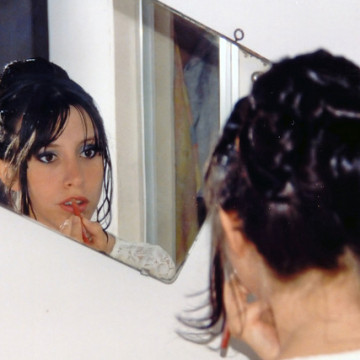The other morning my cousin Brie called me for advice.
“I like a boy,” she began.
“Shouldn’t you be in class?” I asked. Brie is, after all, a fourteen-year-old girl.
“It’s recess.”
I didn’t bother to inform her that when I was fourteen “recess” meant grabbing a quick (and undoubtedly days old, not to mention cold) bagel from the lunch ladies while quickly copying my best friend’s math homework. There were no phones with which to call someone—much less someone on the other side of the country.
“Okay. So… this boy.”
Quickly Brie rattled off facts with the energy and force only a fourteen-year-old girl could muster. He had long hair. He was good at science, but not as good as her. He also liked The Hunger Games and played soccer. “He’s really cute,” she repeated.
“Got it. So ask him out.” I figured cell phones hadn’t deleted that dating basic from human interaction.
I heard the laughter of children in the resounding silence.
“I’m not pretty enough,” Brie answered. A bell rang. “I gotta go.”
“Brie…”
She had hung up before I could say anything else.
I spent the rest of the day wondering what I would say to Brie when she was out of school. My immediate response was to reply, “Brie, of course you’re beautiful! He’d be lucky to date you.”

Don’t define yourself based on mere reflection on the mirror. The real you is standing in front of it.
But Brie needed more than a compliment on her looks. Why did my need to comfort my young cousin go hand-in-hand with telling her she was attractive? Brie’s worth as an individual far surpassed superficial markers such as physical beauty. She was a caring middle-schooler with a sharp mind who read at a high school reading level. That was what really mattered. And yet all I had originally thought to tell her was that she was pretty.
When Brie called me back later that night I immediately listed all the ways she was special—and that was before I casually mentioned that she was a looker, too. Brie listened to my list of her positive attributes, but stopped me when I mentioned her looks.
“Mom won’t show me how to put on eyeliner,” she said. “It’s not fair. Sarah wears it every day and I just want to wear it to the dance. It’s not like I’m asking to wear heels. God!”
Brie didn’t care that she was smart. She didn’t care that she was the kind of girl who, when she broke her leg playing softball, had friends who visited her religiously at the hospital. She cared about something that would fade, no matter how much she tried to stop it: her looks.
I knew what she was going to ask before she did.
“Will you teach me how to use liner?”
And heaven help me, I agreed.
Now, as I gear up for a Skype date where I show Brie how to use an eye pencil without poking out her retina, I’ve created a list of things to say. As I explain how to hold the pencil, how to pull the line away from her eye, how to not blink, I plan to remind Brie of all the ways she is great that really matter. I plan to point out that her good grades and how hard she works to excel in Advanced Algebra far outweighs the amount of brain cells it takes to trace an eye. She may not listen, but at least she’ll hear me.
I can’t stop the world from judging girls by their looks. Many of us have been trying, and while strides have been made, we’re far from successful. But I think it is up to mothers, sisters, friends, and lovers to remind one another that self-value entangled with physical beauty will always end up cutting you far deeper than you’d expect as you fight for your freedom. I should know–accepting my own beauty has been a lifelong struggle for me. In my cousin, I see my teenage self who felt the same anxieties, and who desperately needed an adult to tell me all the greeting card quotes with conviction.
Makeup, I plan to tell Brie, is a lie. There’s no controlling physical beauty. But we can control how we treat one another. We can control how much we learn in school, how much we care about the environment or our friends. And, in the end, I’ll remind Brie while she dabs makeup remover on a cotton ball, that innate goodness, the kind that is cultivated with care, that’s what makes someone really, truly beautiful. That eyeliner could never light up one’s face the way a smile does.
Also in Balance: Ahimsa – The Link Between Yoga and Veganism
Also by Emily: Grandmothers (and Mothers) Don’t Always Know Best
Dine Like an Edwardian Vegan – 2 Downton Abbey Recipes
___
Photo: Christine via Flickr




